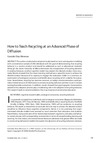Identificador persistente para citar o vincular este elemento:
https://accedacris.ulpgc.es/jspui/handle/10553/75575
| Campo DC | Valor | idioma |
|---|---|---|
| dc.contributor.author | Díaz Meneses, Gonzalo | en_US |
| dc.date.accessioned | 2020-11-16T12:57:50Z | - |
| dc.date.available | 2020-11-16T12:57:50Z | - |
| dc.date.issued | 2006 | en_US |
| dc.identifier.issn | 0095-8964 | en_US |
| dc.identifier.other | Scopus | - |
| dc.identifier.uri | https://accedacris.ulpgc.es/handle/10553/75575 | - |
| dc.description.abstract | The author conducted an empirical study based on structural equation modeling with a convenience sample of 246 individuals with the goal of demonstrating that recycling behavior is a routine conduct and should be addressed as such in educational materials. Although the classic hierarchy of effects dominates the interpretation of recycling behavior in existing literature, another cognitive model may explain this desired conduct more accurately. Results showed that the classic learning method was a powerful route to achieve the desired conduct because of its capacity to engage the evaluation holder in a conscious re-examination of ecological conscience and beliefs about recycling which underlie the evaluations. Nevertheless, recycling has become common, so today's environmentalists could provide a limited amount of information to activate recycling behavior and then to set in motion existing favorable evaluations. In addition, results showed that psychographic characteristics related to this adoption process play a moderating role in the adoption of recycling behavior. This research leads to recommendations that may improve environmental education. Copyright © 2006 Heldref Publications. | en_US |
| dc.language | eng | en_US |
| dc.relation.ispartof | Journal of Environmental Education | en_US |
| dc.source | Journal of Environmental Education[ISSN 0095-8964],v. 37 (4), p. 19-32, (Junio 2006) | en_US |
| dc.subject | 530802 Comportamiento del consumidor | en_US |
| dc.subject.other | Cognitive-Based Models | en_US |
| dc.subject.other | Ecological Conscience | en_US |
| dc.subject.other | Recycling Behavior | en_US |
| dc.title | How to teach recycling at an advanced phase of diffusion | en_US |
| dc.type | info:eu-repo/semantics/Article | en_US |
| dc.type | Article | en_US |
| dc.identifier.doi | 10.3200/JOEE.37.4.19-32 | en_US |
| dc.identifier.scopus | 33748555159 | - |
| dc.contributor.authorscopusid | 9132741600 | - |
| dc.description.lastpage | 32 | en_US |
| dc.identifier.issue | 4 | - |
| dc.description.firstpage | 19 | en_US |
| dc.relation.volume | 37 | en_US |
| dc.investigacion | Ciencias Sociales y Jurídicas | en_US |
| dc.type2 | Artículo | en_US |
| dc.utils.revision | Sí | en_US |
| dc.date.coverdate | Junio 2006 | en_US |
| dc.identifier.ulpgc | Sí | en_US |
| dc.contributor.buulpgc | BU-ECO | en_US |
| dc.description.ssci | SSCI | |
| dc.description.erihplus | ERIH PLUS | |
| item.fulltext | Con texto completo | - |
| item.grantfulltext | open | - |
| crisitem.author.dept | GIR IUCES: Dirección de Marketing, RSC y Empresa Familiar | - |
| crisitem.author.dept | IU de Cibernética, Empresa y Sociedad | - |
| crisitem.author.dept | Departamento de Economía y Dirección de Empresas | - |
| crisitem.author.orcid | 0000-0001-6260-385X | - |
| crisitem.author.parentorg | IU de Cibernética, Empresa y Sociedad | - |
| crisitem.author.fullName | Díaz Meneses, Gonzalo | - |
| Colección: | Artículos | |
Citas SCOPUSTM
13
actualizado el 08-jun-2025
Visitas
45
actualizado el 10-ene-2026
Descargas
125
actualizado el 10-ene-2026
Google ScholarTM
Verifica
Altmetric
Comparte
Exporta metadatos
Los elementos en ULPGC accedaCRIS están protegidos por derechos de autor con todos los derechos reservados, a menos que se indique lo contrario.
